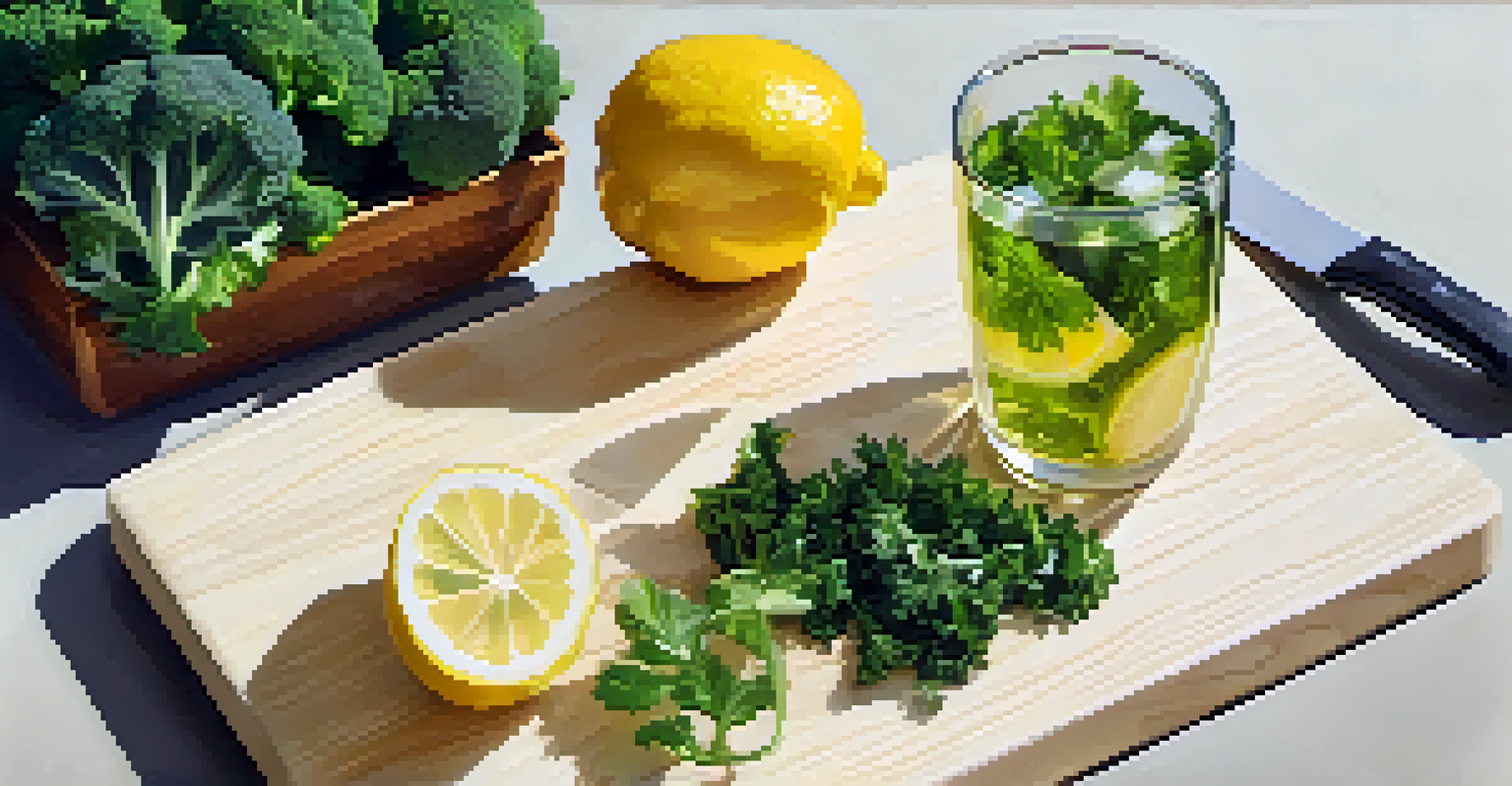The Impact of Raw Foods on Liver Health and Detoxification

Understanding the Liver's Role in Detoxification
The liver is a powerhouse organ responsible for detoxifying our bodies. It filters toxins from the blood, processes nutrients, and produces bile to aid digestion. Without a healthy liver, our bodies struggle to eliminate harmful substances, which can lead to various health issues.
The liver is a vital organ that plays an essential role in detoxification and overall health.
Think of the liver as your body's natural filter. Just like a water filter cleans impurities from drinking water, the liver cleanses your blood of toxins. This essential function impacts everything from energy levels to skin health, making liver care crucial.
By supporting liver health, we can enhance our overall well-being. This is where diet plays a significant role, particularly the inclusion of raw foods, which are packed with nutrients and enzymes that promote liver function.
What Are Raw Foods and Their Benefits?
Raw foods consist of unprocessed, uncooked fruits, vegetables, nuts, and seeds. These foods retain their natural enzymes, vitamins, and minerals, which can be lost during cooking. Eating raw foods can provide a wealth of health benefits, especially for liver health.

The enzymes found in raw foods help in digestion and nutrient absorption, making it easier for the liver to process what we consume. Additionally, these foods are high in antioxidants, which help combat oxidative stress—a major factor in liver damage.
Liver Detoxification is Essential
The liver plays a crucial role in filtering toxins from the blood, highlighting the importance of maintaining its health.
Including more raw foods in your diet can lead to improved energy levels, better digestion, and enhanced detoxification. Essentially, they provide your liver with the support it needs to function at its best.
Key Raw Foods for Liver Health
Certain raw foods are particularly beneficial for liver health. Leafy greens like kale and spinach are packed with chlorophyll, which helps detoxify the liver. Other foods, such as beets and carrots, contain beta-carotene and antioxidants that support liver function.
Eating raw foods is one of the simplest ways to promote health and wellness in the body.
Avocados are another excellent choice; they are rich in healthy fats and glutathione, a compound that helps the liver detoxify. Additionally, cruciferous vegetables like broccoli and Brussels sprouts can enhance the liver's ability to flush out toxins.
Incorporating a variety of these raw foods into your diet can optimize liver health and improve your detoxification processes. A colorful plate is not only visually appealing but also a sign of a nutrient-rich diet.
The Role of Hydration in Detoxification
Staying hydrated is crucial for liver detoxification. Water helps to flush out toxins and supports the liver's ability to process and eliminate waste. Raw fruits and vegetables, which have high water content, can contribute significantly to your hydration needs.
Think of water as the lubricant for your liver's detoxification machinery. Without sufficient fluid, the liver may become sluggish, affecting its ability to perform optimally. This can lead to a buildup of toxins in the body, causing fatigue and other health issues.
Raw Foods Boost Liver Function
Incorporating raw foods into your diet can enhance liver health by providing essential enzymes, vitamins, and antioxidants.
By pairing raw foods with adequate hydration, you create an environment where your liver can thrive. It's a simple yet effective way to support your body's natural detoxification processes.
How Cooking Affects Nutrient Content
Cooking can significantly alter the nutritional profile of foods. While some cooking methods enhance certain nutrients, others can destroy valuable enzymes and vitamins. For instance, boiling vegetables can lead to nutrient loss, while raw consumption retains these benefits.
Raw foods maintain their natural state, providing maximum nutritional value. For example, raw broccoli contains more glucosinolates, compounds that support liver health, compared to its cooked counterpart.
Understanding the effects of cooking on food can motivate you to incorporate more raw options into your diet. By doing so, you can ensure that your liver receives the nutrients it needs for optimal performance.
The Impact of a Raw Food Diet on Overall Health
A raw food diet can lead to a variety of health benefits beyond just liver health. Many people report increased energy levels, weight loss, and improved digestion. These changes often stem from the high fiber content and nutrient density of raw foods.
Moreover, a raw food diet can promote a healthier relationship with food. As you become more aware of what you’re eating, you may be less likely to consume processed foods filled with additives and sugars that harm liver function.
Hydration Supports Detox Processes
Staying hydrated is vital for effective liver detoxification, as water helps flush out toxins and keeps the liver functioning optimally.
Embracing a raw food diet can be a transformative journey. It's not just about the liver; it's about nourishing your entire body and fostering a lifestyle that prioritizes health and wellness.
Potential Challenges of a Raw Food Diet
While there are numerous benefits to a raw food diet, it’s not without challenges. Some people may find it difficult to consume enough calories or balance their nutrient intake, leading to deficiencies if not managed properly. It's essential to plan meals carefully to ensure you meet your nutritional needs.
Additionally, the transition to a raw food diet can be overwhelming for those accustomed to cooked meals. It's like learning to ride a bike; it takes time and practice to become comfortable. Gradually incorporating raw foods can ease this transition.

Being aware of these potential challenges allows you to approach a raw food diet thoughtfully. With the right preparation and knowledge, you can enjoy the benefits while minimizing the downsides.